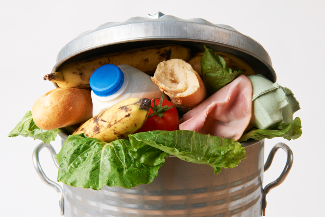Member State Page : Ireland
Last updated on the 02/06/2025

Food waste data – national:
The EPA estimates that Ireland generated 766,000 tonnes of food waste in 2020.
In total in 2021: 753 081 tonnes of food waste

Food waste data – sectoral:
In 2020
Primary production: 70,400
Processing & manufacturing: 215,000 tonnes Retail & distribution: 61,000 tonnes
Restaurants & food services: 178,500 tonnes Households: 241,000 tonnes

Targets:
Halve food waste by 2030
Contact point
Target
Ireland’s Waste Action Plan for a Circular Economy – Ireland’s National Waste Policy 2020-2025, published in September 2020, committed to developing a Food Waste Prevention Roadmap that sets out a series of actions aimed at delivering the reductions necessary to halve our food waste by 2030, meet any other related targets, and promote our transition to a circular economy. This commitment is also included in Food Vision 2030 and the Government of Ireland’s Climate Action Plan.
The National Food Waste Prevention Roadmap 2023-2025 sets out a number of priority actions to bring the focus on food waste prevention, across key sectors in the food supply chain, together in a coherent manner. The Roadmap includes:
The National Food Waste Prevention Roadmap 2023-2025 sets out a number of priority actions to bring the focus on food waste prevention, across key sectors in the food supply chain, together in a coherent manner. The Roadmap includes:
- Context on food waste, what components of the food supply chain are included in the Roadmap
- How Ireland will establish its national baseline data on food waste from which we will achieve a 50% reduction by 2030
Measure
In line with EU reporting obligations, Ireland published the first estimate of food waste levels in 2020 using the EU reporting methodologies and has published annually data thereafter.
An EPA-funded research project, Efficient Food, identified potential data sources and improved knowledge of food loss and waste in primary production.
Robust and consistent measurement of food waste is the first step in food waste prevention, as it provides quality data to monitor food waste generation, support food waste prevention initiatives and report on progress to reduction targets. Through the national waste prevention programme, the EPA is leading work with food business operators to improve the quality of the data for each stage of the food supply chain and use target-based approaches to drive improvements in food waste levels.
The following supports have been published:
An EPA-funded research project, Efficient Food, identified potential data sources and improved knowledge of food loss and waste in primary production.
Robust and consistent measurement of food waste is the first step in food waste prevention, as it provides quality data to monitor food waste generation, support food waste prevention initiatives and report on progress to reduction targets. Through the national waste prevention programme, the EPA is leading work with food business operators to improve the quality of the data for each stage of the food supply chain and use target-based approaches to drive improvements in food waste levels.
The following supports have been published:
- A Food Waste Measurement Protocol to support food and drink manufacturers to identify and quantify their food waste streams and put in place actions to reduce their food waste. Sector specific guidance on food waste measurement has been published for the bakery sector, prepared food sector, seafood sector and is in development of the brewing, distilling, meat and dairy sectors.
- The Food Service Pathway is a four-step pathway for hospitality businesses to estimate food waste in a consistent way, track performance & identify how to reduce food waste.
- A Food Waste Measurement Tool for Public Sector Offices.
- For these resources go to: www.foodwastecharter.ie/resources/.
Act
The Environmental Protection Agency has a statutory role to establish national Food waste prevention programmes and these are implemented through the Circular Economy Programme. There are programmes targeting food waste in households and across the full food & drink business supply chain, with a view to achieving the national target for a 50% reduction in food waste by 2030.
- Household food waste: actions include national communication campaigns and awareness raising activities through the stopfoodwaste.ie website and application of behavioural insights to achieve widespread public awareness of environmental and social issues around wasted food; in order to achieve a significant increase in the number of people taking action on the issue.
- Supply chain and hospitality: activities to drive change across the retail, distribution, processing and manufacturing sub-sectors, and reducing food waste in the hospitality and food service sectors. The primary vehicle is the Food Waste Charter. Originally launched in 2017 with a focus on the grocery retail sector, the Charter was relaunched in 2023 inviting businesses across the full food supply chain to pledge their commitment to food waste. See www.foodwastecharter.ie for more information.
- Data and evidence:
- National food waste statistics are published annually. See Food Waste Statistics | Environmental Protection Agency (epa.ie)
- National municipal waste characterisation studies. See Waste Characterisation | Environmental Protection Agency (epa.ie)
- Behavioural insight is a foundation of the national food waste prevention programmes, with quantitative and qualitative research providing evidence and data to inform policy, behavioural change interventions and awareness campaigns, establish sectoral benchmarks and indicators, and to monitor progress. See: Food Waste: Behavioural Insights Research | Environmental Protection Agency (epa.ie)
Relevant resources
Links
